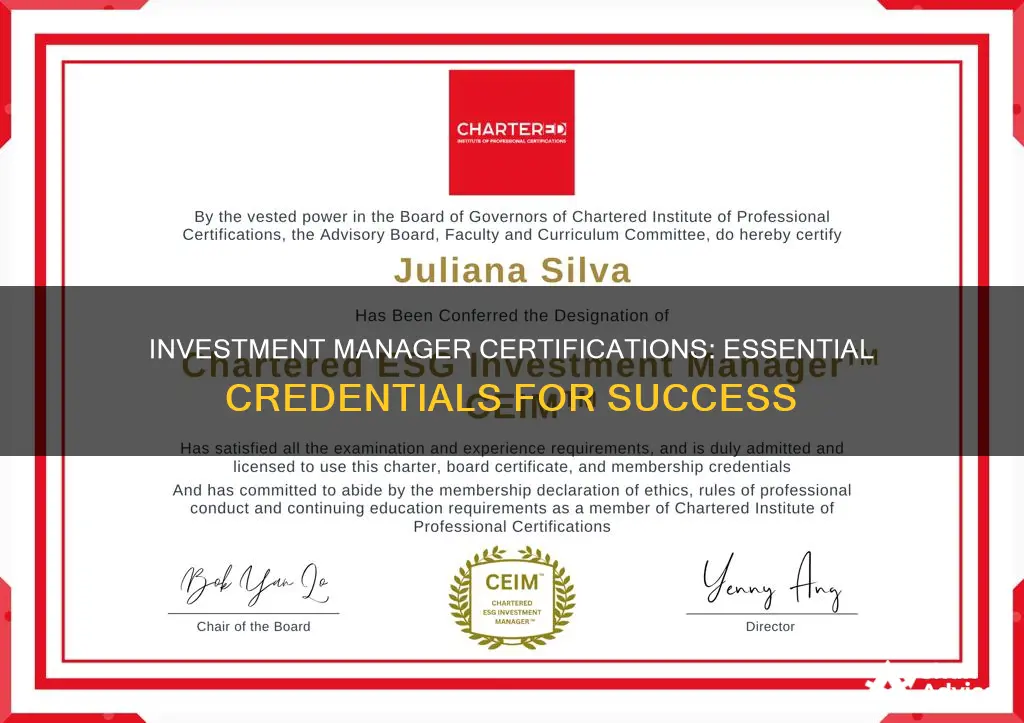
Financial certifications are a key indicator of an investment manager's dedication to their profession. They demonstrate a commitment to industry standards, personal professionalism, continued learning, and, in some cases, a commitment to a code of ethics. While there are many certifications available, some of the most common and prestigious designations for investment managers include the Certified Financial Planner (CFP), Chartered Financial Analyst (CFA), Chartered Financial Consultant (ChFC), and Certified Public Accountant (CPA). These certifications require long hours of study, rigorous exams, and, in some cases, extensive professional experience. Obtaining these certifications can enhance an investment manager's credibility and expertise in the eyes of potential clients.
What You'll Learn

Certified Financial Planner (CFP)
The Certified Financial Planner (CFP) certification is one of the most widely recognised designations in the industry. As of June 1, 2024, over 100,000 financial advisors held the CFP designation across all 50 US states, as well as in the District of Columbia, Puerto Rico, the Virgin Islands, and Guam.
The CFP certification is owned and awarded by the Certified Financial Planner Board of Standards, Inc. The CFP Board's certification process is rigorous but rewarding, giving candidates the knowledge and skills needed for a fulfilling career. The CFP Board also offers guidance, tools, and support to help candidates successfully become CFP professionals.
To earn a CFP certification, candidates must meet the "4 E's": Education, Exam, Experience, and Ethics.
Education
The education requirement is twofold: candidates must complete coursework on financial planning through a CFP Board Registered Program, and they must hold a bachelor's degree or higher (in any discipline) from an accredited college or university. The coursework must be completed before taking the CFP exam, and candidates have 5 years from the date they pass the exam to complete the bachelor's degree requirement. The average time to complete the coursework is 12-18 months.
Exam
The CFP exam is a rigorous assessment that demonstrates a candidate's knowledge and competency in providing comprehensive personal financial planning advice. It is a 170-question, multiple-choice test, consisting of two 3-hour sessions over one day. The exam covers a range of topics, including financial planning principles, retirement planning, risk management, taxes, and insurance. The pass rate for first-time exam takers in 2019 was approximately 67%.
Experience
The experience requirement prepares candidates to provide personal financial planning to the public without supervision. Candidates need to complete either 6,000 hours of professional experience related to the financial planning process or 4,000 hours of apprenticeship experience that meets additional requirements. This experience can be fulfilled either before or after taking the exam.
Ethics
The ethics requirement is the final step towards CFP certification. Candidates must agree to adhere to high ethical and professional standards and act as fiduciaries when providing financial advice, always putting their clients' best interests first. They must sign an Ethics Declaration, and the CFP Board conducts a background check as part of this process.
Overall, the CFP certification process typically takes 18-24 months to complete, but it offers flexibility to accommodate different candidates' needs.
Dismissing Your Investment Manager: When and How to Do It
You may want to see also

Chartered Financial Analyst (CFA)
The Chartered Financial Analyst (CFA) certification is one of the most prestigious designations for investment analysts. Offered by the CFA Institute, the CFA charter is a sign of in-depth knowledge of asset management and securities analysis, as well as a commitment to the highest ethical standards.
To become a CFA charterholder, candidates must complete a rigorous three-part exam, gain at least 4,000 hours of work experience over a minimum of three years, and demonstrate competence and extensive knowledge in accounting, economics, portfolio management, and securities analysis. The CFA Institute also requires candidates to have a bachelor's degree from an accredited educational institute or a combination of a bachelor's degree, work experience, and/or higher education totalling 4,000 hours in three sequential years.
CFA charterholders are well-respected in the industry and are often analysts working in institutional money management and stock analysis. They provide research and ratings on various forms of investments, offering investment advice, portfolio management, and risk management services to high-net-worth private clients.
The CFA qualification is highly regarded, with a pass rate of just 20% for all three levels of the exam. Obtaining the CFA charter demonstrates a strong foundation in financial analysis and a commitment to ethical standards, making it an excellent choice for those seeking a career as an investment manager.
Investment Management Fees: Are They Deductible by a Trust?
You may want to see also

Certified Public Accountant (CPA)
To become a CPA, candidates must meet education, work, and examination requirements. This includes holding a bachelor's degree, typically in business administration, finance, or accounting, and completing 150 hours of education. CPA candidates must also have two or more years of experience in public accounting.
CPAs have a wide range of career options available in public accounting, corporate accounting, or government service. They can also move into executive positions such as controller or chief financial officer (CFO). CPAs compile, maintain, and review financial statements, prepare tax returns, and perform audits. They may also specialise in areas such as auditing, bookkeeping, forensic accounting, and managerial accounting.
The CPA certification is valuable for investment managers as it demonstrates expertise in accounting and financial planning. CPAs can provide financial planner services and help clients with tax-based needs in estate transfer, business succession, and risk management.
The CPA certification requires a significant time commitment and a challenging exam. However, it offers a good return on investment, with CPAs earning 25% more, on average, than non-CPA accountants. CPAs also tend to advance to positions of more responsibility and are often promoted to senior-level jobs.
Understanding Pips: Portfolio Investment Strategy Basics
You may want to see also

Chartered Life Underwriter (CLU)
A Chartered Life Underwriter (CLU) is a financial advisor that specializes in life insurance and estate planning. This is not a standalone service—CLUs operate as part of an estate planning team, usually for high-net-worth clients with complex holdings, including family businesses and complicated asset structures.
The American College of Financial Services confers the CLU designation. Candidates must have three years of relevant experience, pass eight training classes, and sit for an exam. There is also a continuing education requirement of 30 hours every two years. The CLU certification is highly respected and is nearly 100 years old, second only in age to the CPA.
The CLU program offers an in-depth understanding of the practical, legal, and ethical aspects of life insurance and its techniques and tools. The curriculum covers the fundamentals of life and health insurance, pension planning, insurance law, income taxation, investments, financial and estate planning, and group benefits.
CLU status can be revoked for misconduct or breaching the code of ethics.
Calculating ROI on Your Investment Portfolio: A Step-by-Step Guide
You may want to see also

Chartered Financial Consultant (ChFC)
The Chartered Financial Consultant (ChFC) designation is issued by The American College of Financial Services and is considered a desirable alternative to the CFP certification. As of June 2024, more than 50,000 professionals hold this certification.
To obtain the ChFC designation, candidates must possess a high school diploma or equivalent GED and have three years of full-time experience in financial planning or a related field within the five years preceding the award of the designation. The coursework is self-study and covers eight courses, the majority of which cover the same topics as the CFP certification. However, the ChFC designation also incorporates topics such as small-business planning, behavioural finance, financial planning for divorce, and planning for clients with special needs, LGBTQ+ clients, or unmarried couples.
Designees are required to complete 30 hours of continuing education every two years, including one hour of ethics. They also have an annual certification process.
The ChFC degree program requires students to complete nine college-level courses or 27 hours of college credit in the field. Students must achieve mastery of more than 100 integrated advanced financial planning topics, including:
- Financial Planning Process and Environment
- Employee Benefits Planning
- Asset Protection Planning
- Estate Tax, Transfer Tax, and Gift Tax Planning
- Applications of Comprehensive Financial Planning and Consulting
The ChFC curriculum also covers how rules within these segments change in relation to small business planning, financial planning for households in the process of divorce, or for families with special needs dependents.
The ChFC designation is a good choice for those seeking an investment manager. It is well-respected in the industry and demonstrates a commitment to industry standards and continued learning.
Enhancing Investment Management Savvy: Strategies for Success
You may want to see also
Frequently asked questions
Some certifications that an investment manager should have include the Certified Financial Planner (CFP), Chartered Financial Analyst (CFA), Chartered Financial Consultant (ChFC), and Chartered Investment Counselor (CIC).
A CFA focuses on asset management and securities analysis, while a CFP takes a holistic approach to financial planning, covering budgeting, retirement planning, life insurance, taxes, and estate planning.
While both designations offer similar services, a ChFC may offer slightly more depth as it requires additional coursework and experience.
A CFA charter-holder tends to work in the field of institutional money management and stock analysis, while a CIC designation is for CFA charter-holders who are registered investment advisors and focuses on portfolio management.
These certifications indicate a high level of education, training, specialization, and commitment to ethical standards. They can also help investment managers attract clients and provide assurance of their expertise and professionalism.







